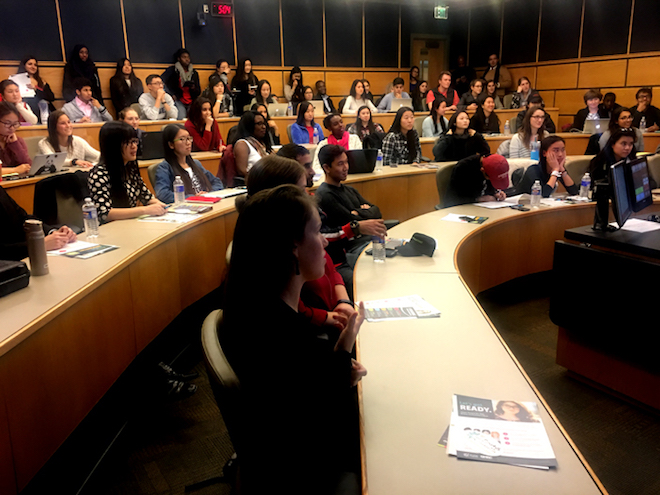
Students in a classroom at Cornell University. Courtesy photo
Like many industries, commercial real estate has a diversity issue. Only 2% of executive-level positions in the real estate industry are held by Black men.
That’s something the Philip Payton Society for Minority Real Estate Professionals, a club established by students at Cornell University’s Baker Program in Real Estate, is trying to change. The organization helps introduce underrepresented students to the commercial real estate industry and connect them with established industry professionals in order to create a pipeline of minority talent.
“These students might be interested in real estate and they might be trying to break into the industry, but without a real network like the Philip Payton Society to connect them with real industry players, it would be much more difficult for people of color — especially those who don’t have preexisting family networks or professional networks — to be able to break into the industry,” Cody Perez, president of the Philip Payton Society and a dual degree candidate in Cornell’s MBA/Master of Real Estate program, says. “The Philip Payton Society gives them a pathway to success that isn’t really there otherwise.”
ANNUAL CASE COMPETITION A WAY TO INTRODUCE STUDENTS TO REAL-LIFE REAL ESTATE CASE STUDIES
The Society recently hosted its annual case competition, which included nearly 50 students, including students from across 14 Historically Black Colleges and Universities (HBCUs). Students represented a range of academic majors including business, economics, construction management, accounting, and architecture.
As part of the case competition, student teams analyze a commercial real estate case study and present their findings to a panel of established industry judges and prominent Cornell alumni. The top three winning teams split a cash prize of $5,000. In addition, students also analyze a variety of learning modules taught by Cornell Master of Real Estate students and learn the necessary financial and analytical skills of real estate.
“There are buyers and sellers in real estate. But in between buyers and sellers, there are a lot of things that go on,” Alex Susskind, associate dean for Academic Affairs at Cornell’s School of Hotel Administration, says. “This [case competition] provides them with a platform to understand how the business of real estate works.”
Exposure to the industry is a critical goal of the case competition. Cornell’s Real Estate Council, a 2,000-member non-profit organization, sponsored the competition and helped fund the prize money as part of its Diversity, Equity and Inclusion initiative.
“We feel like this is a great opportunity for students of color who might not be exposed to the real estate industry to get some visibility, learn a bit about what the industry actually is and the career paths are, and expose them to the type of work that people in the industry handle on a daily basis,” Perez says.
CREATING AN EQUAL PLAYING GROUND
The case competition is just one of the many initiatives that the Society has created to give underrepresented students a pathway into the real estate industry. In addition to networking opportunities, the Society is also creating an intercollegiate black commercial real estate network.
“We’re hoping that organizations similar to PPS at other schools will be able to plug into this network of minority students across the country and students in these programs will be able to leverage one another whether it’s information or connections,” Perez says. “We hope this will give students of color more of an equal playing ground.”
That network is crucial for creating an equal playing ground for underrepresented students who have an interest in real estate but may not have the means or connections to break into the industry.
Perez and Susskind know that the real estate industry, like many other fields, lacks diversity.
They hope that the Society will provide a space for minorities to not only learn about the industry but also connect them with like-minded professionals of color and offer them a path to success.
“It helps young professionals see people like themselves who are in advanced stages of their careers,” Susskind says. “That’s a really important thing – to see people like you. Because it creates a level of comfort and understanding that there is a path and there is an opportunity for students to do this.”
DON’T MISS:











Questions about this article? Email us or leave a comment below.